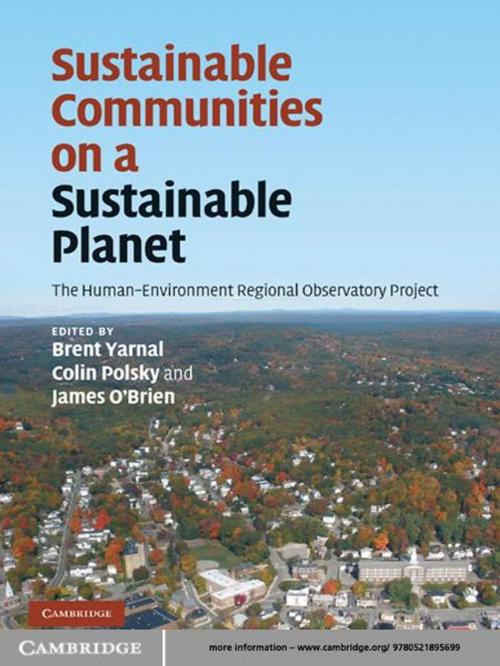Sustainable Communities on a Sustainable Planet
The Human-Environment Regional Observatory Project
Nonfiction, Science & Nature, Science, Biological Sciences, Environmental Science, Technology| Author: | ISBN: | 9780511699894 | |
| Publisher: | Cambridge University Press | Publication: | September 24, 2009 |
| Imprint: | Cambridge University Press | Language: | English |
| Author: | |
| ISBN: | 9780511699894 |
| Publisher: | Cambridge University Press |
| Publication: | September 24, 2009 |
| Imprint: | Cambridge University Press |
| Language: | English |
Scientists and policymakers have realised that localities are central to addressing the causes and consequences of global environmental change. The goal of the Human-Environment Regional Observatory project (HERO) was to develop the infrastructure necessary to monitor and understand the local dimensions of global change. This book presents the philosophy behind HERO, the methods used to put that philosophy into action, its results, and the lessons learned from the project. HERO used three strategies: it developed research protocols and data standards for collecting data; it built a web-based networking environment to help investigators share data, analyses and ideas from remote locations; and investigators field-tested these concepts by applying them in diverse biophysical and socioeconomic settings - central Massachusetts, central Pennsylvania, southwestern Kansas, and the US-Mexico border region of Arizona. The book highlights the unique focus of HERO regarding thinking and acting on complex, integrative, and interdisciplinary global change science at local scales, and is valuable for global change scientists.
Scientists and policymakers have realised that localities are central to addressing the causes and consequences of global environmental change. The goal of the Human-Environment Regional Observatory project (HERO) was to develop the infrastructure necessary to monitor and understand the local dimensions of global change. This book presents the philosophy behind HERO, the methods used to put that philosophy into action, its results, and the lessons learned from the project. HERO used three strategies: it developed research protocols and data standards for collecting data; it built a web-based networking environment to help investigators share data, analyses and ideas from remote locations; and investigators field-tested these concepts by applying them in diverse biophysical and socioeconomic settings - central Massachusetts, central Pennsylvania, southwestern Kansas, and the US-Mexico border region of Arizona. The book highlights the unique focus of HERO regarding thinking and acting on complex, integrative, and interdisciplinary global change science at local scales, and is valuable for global change scientists.















